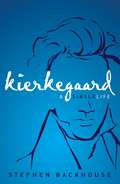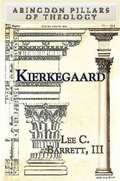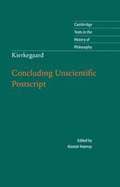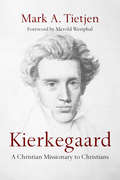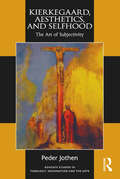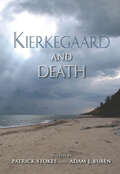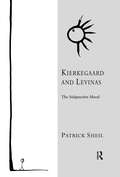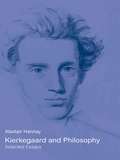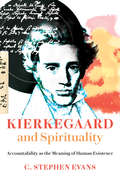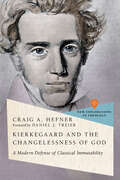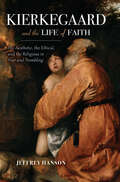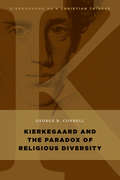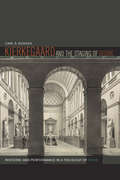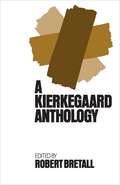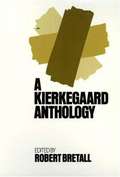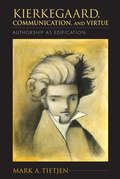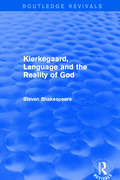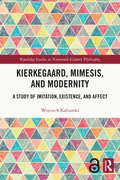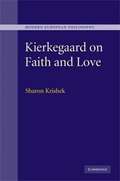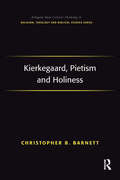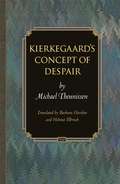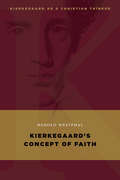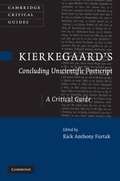- Table View
- List View
Kierkegaard: A Single Life
by Stephen BackhouseDiscover a new understanding of Kierkegaard’s thought and his life, a story filled with romance, betrayal, humor, and riots. Kierkegaard, like Einstein and Freud, is one of those geniuses whose ideas permeate the culture and shape our world even when relatively few people have read their works. That lack of familiarity with the real Kierkegaard is about to change. This lucid new biography by scholar Stephen Backhouse presents the genius as well as the acutely sensitive man behind the brilliant books. Scholarly and accessible, Kierkegaard: A Single Life introduces his many guises—the thinker, the lover, the recluse, the writer, the controversialist—in prose so compelling it reads like a novel. One chapter examines Kierkegaard’s influence on our greatest cultural icons—Kafka, Barth, Bonhoeffer, Camus, and Martin Luther King Jr., to name only a few. A useful appendix presents an overview of each of Kierkegaard’s works, for the scholar and lay reader alike.
Kierkegaard: Essays In Honor Of Jon Stewart (Abingdon Pillars of Theology)
by Lee C. Barrett IIIAbingdon Pillars of Theology is a series for the college and seminary classroom designed to help students grasp the basic and necessary facts, influence, and significance of major theologians. Written by noted scholars, these books will outline the context, methodology, organizing principles, primary contributions, and key writings of people who have shaped theology as we know it today.Søren Kierkegaard (1813-1855) "foresaw, the power of mass culture to numb the human spirit has only waxed in strength and virulence. The prostitution of religion to legitimate self-aggrandizing ideologies has become a veritable global industry. The reduction of neighbor-love to the most minimal standards of decent behavior has devolved to the point where slightly altruistic celebrities are heralded as Christ-like saints. The deep yearnings of the human heart are being suffocated by trivial amusements, technological toys, and the manipulation of the psyche. Now, perhaps more than ever, Christianity needs an aggravating Socrates to disturb its complicity with a culture of individual self-gratification and corporate self-deification." from the bookLee C. Barrett, III is Mary B. and Hanry P. Stager Chair in Theology, Professor of Systematic Theology at Lancaster Theological Seminary in Lancaster, Pennsylvania.
Kierkegaard: Concluding Unscientific Postscript
by Alastair Hannay Søren KierkegaardConcludes the first and richest phase of Kierkegaard's pseudonymous authorship and is the text that philosophers look to first when attempting to define Kierkegaard's own philosophy. Familiar Kierkegaardian themes are introduced in the work, including truth as subjectivity, indirect communication, the leap, and the impossibility of forming a philosophical system for human existence. The Postscript sums up the aims of the preceding pseudonymous works and opens the way to the next part of Kierkegaard's increasingly tempestuous life: it can thus be seen as a cornerstone of his philosophical thought. This volume offers the work in a new and accessible translation by Alastair Hannay, together with an introduction that sets the work in its philosophical and historical contexts.
Kierkegaard: A Christian Missionary to Christians
by Mark A. TietjenSøren Kierkegaard (1813-1855) had a mission. The church had become weak, flabby and inconsequential. Being a Christian was more a cultural heritage than a spiritual reality. His mission—reintroduce the Christian faith to Christians. How could he break through to people who were members of the church and thought they were Christians already? Like an Old Testament prophet, Kiergegaard used a variety of pointed and dramatic ways to shake people from their slumber. He incisively diagnosed the spiritual ailments of his age and offered a fresh take on classic Christian teaching. Mark Tietjen thinks that Kierkegaard's critique of his contemporaries strikes close to home today. We also need to listen to one of the most insightful yet complex Christian thinkers of any era. Through an examination of core Christian doctrines—the person of Jesus Christ, human nature, Christian witness and love—Tietjen helps us hear Kierkegaard's missionary message to a church that often fails to follow Christ with purity of heart.
Kierkegaard, Aesthetics, and Selfhood: The Art of Subjectivity (Routledge Studies in Theology, Imagination and the Arts)
by Peder JothenIn the digital world, Kierkegaard's thought is valuable in thinking about aesthetics as a component of human development, both including but moving beyond the religious context as its primary center of meaning. Seeing human formation as interrelated with aesthetics makes art a vital dimension of human existence. Contributing to the debate about Kierkegaard's conception of the aesthetic, Kierkegaard, Aesthetics, and Selfhood argues that Kierkegaard's primary concern is to provocatively explore how a self becomes Christian, with aesthetics being a vital dimension for such self-formation. At a broader level, Peder Jothen also focuses on the role, authority, and meaning of aesthetic expression within religious thought generally and Christianity in particular.
Kierkegaard and Death
by Adam Buben Patrick StokesFew philosophers have devoted such sustained, almost obsessive attention to the topic of death as Søren Kierkegaard. Kierkegaard and Death brings together new work on Kierkegaard's multifaceted discussions of death and provides a thorough guide to the development, in various texts and contexts, of Kierkegaard's ideas concerning death. Essays by an international group of scholars take up essential topics such as dying to the world, living death, immortality, suicide, mortality and subjectivity, death and the meaning of life, remembrance of the dead, and the question of the afterlife. While bringing Kierkegaard's philosophy of death into focus, this volume connects Kierkegaard with important debates in contemporary philosophy.
Kierkegaard and Levinas: The Subjunctive Mood (Transcending Boundaries in Philosophy and Theology)
by Patrick SheilThe Danish Christian existentialist Søren Kierkegaard (1813-1855) and the Jewish Lithuanian-born French interpreter of modern phenomenology Emmanuel Levinas (1906-1995) have enabled theology and philosophy to illuminate and confront one another in radical and important ways. This book addresses the theological and philosophical thought of both Kierkegaard and Levinas with a focus on the special form that exists in the grammar of many languages for cases of uncertainty, possibility, hypothesis and for expressions of hope: the subjunctive mood. As well as presenting arguments and observations about Kierkegaard and Levinas through an analysis of the subjunctive mood, Patrick Sheil offers an interesting and accessible way into the thought of these two major European philosophers and he explores a wide range of Kierkegaardian and Levinasian texts throughout.
Kierkegaard and Philosophy: Selected Essays
by Alastair HannayKierkegaard and Philosophy makes many of the most important papers on Kierkegaard available in one place for the first time. These seventeen essays, written over a period of over twenty years, have all been substantially revised or specially prepared for this collection, with a new introduction by the author.In the first part, Alastair Hannay concentrates on Kierkegaard's central philosophical writings, offering closely text-based accounts of the silent concepts Kierkegaard uses. The second part shows the relevance of other thinkers' treatments of shared themes, pointing out where they differ from Kierkegaard. The concluding chapter provides a reason Kierkegaard himself would give for disagreeing with those who claim his texts are infinitely interpretable.Written by the world's foremost Kierkegaard scholar and translator, Kierkegaard and Philosophy is an indispensible resource for all students of Kierkegaard's work.
Kierkegaard and Spirituality: Accountability as the Meaning of Human Existence (Kierkegaard as a Christian Thinker)
by C. Stephen EvansWe live spiritually when we live in the presence of God.The Danish philosopher Søren Kierkegaard is often read for his contributions to Christian theology, but he also has much to offer about spirituality—both Christian and more generally human. C. Stephen Evans assesses Kierkegaard&’s belief that true spirituality should be seen as accountability: the grateful recognition of our existence as gift. Spirituality takes on a Christian flavor when one recognizes in Jesus Christ the human incarnation of the God who gives us being. In this clearly written and substantive book a leading scholar on Kierkegaard&’s thought makes Kierkegaard&’s contributions to spirituality accessible not only to philosophers and theologians but to pastors, spiritual directors, and lay Christians. The Kierkegaard and Christian Thought series, coedited by C. Stephen Evans and Paul Martens, aims to promote an enriched understanding of nineteenth-century philosopher-theologian Søren Kierkegaard in relation to other key figures in theology and key theological concepts.
Kierkegaard and the Changelessness of God: A Modern Defense of Classical Immutability (New Explorations in Theology)
by Craig A. HefnerDanish theologian and philosopher Søren Kierkegaard was not afraid to express his opinions. Living amid what he perceived to be a culturally lukewarm Christianity, he was often critical of his contemporary church. But that does not mean Kierkegaard rejected traditional Christian theology. Indeed, at a time when many of his contemporaries were questioning the classical doctrine of God, Kierkegaard swam against the stream by maintaining orthodox Christian beliefs. In this volume in IVP Academic's New Explorations in Theology series, Craig A. Hefner explores Kierkegaard's reading of Scripture and his theology to argue not only that the great Dane was a modern defender of the doctrine of divine immutability (or God's changelessness) in response to the disintegration of the self, but that his theology can be a surprising resource today. Even as the church continues to be beset by "shifting shadows" (James 1:17), Kierkegaard can remind us of the good and perfect gifts that come from an unchanging God.
Kierkegaard and the Life of Faith: The Aesthetic, the Ethical, and the Religious in Fear and Trembling
by Jeffrey A. HansonSoren Kierkegaard's Fear and Trembling is one of the most widely read works of Continental philosophy and the philosophy of religion. While several commentaries and critical editions exist, Jeffrey Hanson offers a distinctive approach to this crucial text. Hanson gives equal weight and attention to all three of Kierkegaard’s "problems," dealing with Fear and Trembling as part of the entire corpus of Kierkegaard's production and putting all parts into relation with each other. Additionally, he offers a distinctive analysis of the Abraham story and other biblical texts, giving particular attention to questions of poetics, language, and philosophy, especially as each relates to the aesthetic, the ethical, and the religious. Presented in a thoughtful, well-informed, and fresh manner, Hanson’s claims are original and edifying. This new reading of Kierkegaard will stimulate fruitful dialogue on well-traveled philosophical ground.
Kierkegaard and the Paradox of Religious Diversity (Kierkegaard as a Christian Thinker)
by George B. ConnellSøren Kierkegaard (1813–1855) famously critiqued Christendom — especially the religious monoculture of his native Denmark. But what would he make of the dizzying diversity of religious life today? In this book George Connell uses Kierkegaard’s thought to explore pressing questions that contemporary religious diversity poses. Connell unpacks an underlying tension in Kierkegaard, revealing both universalistic and particularistic tendencies in his thought. Kierkegaard’s paradoxical vision of religious diversity, says Connell, allows for both respectful coexistence with people of different faiths and authentic commitment to one’s own faith. Though Kierkegaard lived and wrote in a context very different from ours, this nuanced study shows that his searching reflections on religious faith remain highly relevant in our world today.
Kierkegaard and the Paradox of Religious Diversity (Kierkegaard as a Christian Thinker)
by George B. ConnellSøren Kierkegaard (1813–1855) famously critiqued Christendom — especially the religious monoculture of his native Denmark. But what would he make of the dizzying diversity of religious life today? In this book George Connell uses Kierkegaard&’s thought to explore pressing questions that contemporary religious diversity poses. Connell unpacks an underlying tension in Kierkegaard, revealing both universalistic and particularistic tendencies in his thought. Kierkegaard&’s paradoxical vision of religious diversity, says Connell, allows for both respectful coexistence with people of different faiths and authentic commitment to one&’s own faith. Though Kierkegaard lived and wrote in a context very different from ours, this nuanced study shows that his searching reflections on religious faith remain highly relevant in our world today.
Kierkegaard and the Staging of Desire: Rhetoric and Performance in a Theology of Eros
by Carl S. HughesTheology in the modern era often assumes that the consummate form of theological discourse is objective prose—ignoring or condemning apophatic traditions and the spiritual eros that drives them. For too long, Kierkegaard has been read along these lines as a progenitor of twentieth-century neo-orthodoxy and a stern critic of the erotic in all its forms. In contrast, Hughes argues that Kierkegaard envisions faith fundamentally as a form of infinite, insatiable eros. He depicts the essential purpose of Kierkegaard’s writing as to elicit ever-greater spiritual desire, not to provide the satisfactions of doctrine or knowledge. Hughes’s argument revolves around close readings of provocative, disparate, and (in many cases) little-known Kierkegaardian texts. The thread connecting all of these texts is that they each conjure up some sort of performative “stage setting,” which they invite readers to enter. By analyzing the theological function of these texts, the book sheds new light on the role of the aesthetic in Kierkegaard’s authorship, his surprising affinity for liturgy and sacrament, and his overarching effort to conjoin eros for God with this-worldly love.
Kierkegaard and the Theology of the Nineteenth Century
by George PattisonThis study shows how Kierkegaard's mature theological writings reflect his engagement with the wide range of theological positions which he encountered as a student, including German and Danish Romanticism, Hegelianism and the writings of Fichte and Schleiermacher. George Pattison draws on both major and lesser-known works to show the complexity and nuances of Kierkegaard's theological position, which remained closer to Schleiermacher's affirmation of religion as a 'feeling of absolute dependence' than to the Barthian denial of any 'point of contact', with which he is often associated. Pattison also explores ways in which Kierkegaard's theological thought can be related to thinkers such as Heidegger and John Henry Newman, and its continuing relevance to present-day debates about secular faith. His volume will be of great interest to scholars and students of philosophy and theology.
Kierkegaard Anthology
by Robert BretallThis anthology covers the whole of Kierkegaard's literary career. The selections range from the terse epigrams of the Journal through the famous "Diary of the Seducer" and the "Banquet" scene, in which Søren Kierkegaard reveals his great lyric and dramatic gifts, on to the philosophical and psychological works of his maturity. These are climaxed by the beautiful and moving religious discourses which accompany them; finally, there is the biting satire of his Attack upon "Christendom."This is emphatically not a collection of "snippets," but the cream of Kierkegaard, each selection interesting and intelligible in itself, and all ranking among his most important work. They are so arranged as to convey an idea of his remarkable intellectual development.Contents: A comprehensive anthology from the following works: Either/Or Fear and Trembling Stages on Life's Way Works of Love Concluding Unscientific Postscript Attack upon "Christendom" The Sickness Unto Death Philosophical Fragments and other?
A Kierkegaard Anthology
by Robert Bretall Søren KierkegaardThis anthology covers the whole of Kierkegaard's literary career. The selections range from the terse epigrams of the Journal through the famous "Diary of the Seducer" and the "Banquet" scene, in which Søren Kierkegaard reveals his great lyric and dramatic gifts, on to the philosophical and psychological works of his maturity. These are climaxed by the beautiful and moving religious discourses which accompany them; finally, there is the biting satire of his Attack upon "Christendom. " This is emphatically not a collection of "snippets," but the cream of Kierkegaard, each selection interesting and intelligible in itself, and all ranking among his most important work. They are so arranged as to convey an idea of his remarkable intellectual development.
Kierkegaard, Communication, and Virtue: Authorship As Edification
by Mark A. TietjenIn contrast to recent postmodern and deconstructionist readings, Mark A. Tietjen believes that the purpose behind Kierkegaard's writings is the moral and religious improvement of the reader. Tietjen defends Kierkegaard against claims that certain features of his works, such as pseudonymity, indirect communication, irony, and satire are self-deceived or deceitful. Kierkegaard, Communication, and Virtue reveals how they are directly related to the virtues or moral issues being discussed. In fact, Tietjen argues, the manner of presentation is a critical element of the philosophical message being conveyed. Reading broadly in Kierkegaard's writings, he develops a hermeneutics of trust that fully illustrates Kierkegaard's aim to evoke faith in his reader.
Kierkegaard, Language and the Reality of God (Routledge Revivals)
by Steven ShakespeareThis title was first published in 2001: Debate about the reality of God risks becoming an arid stalemate. An unbridgeable gulf seems to be fixed between realists, arguing that God exists independently of our language and beliefs, and anti-realists for whom God-language functions to express human spiritual ideals, with no reference to a reality external to the faith of the believer. Soren Kierkegaard has been enlisted as an ally by both sides of this debate. Kierkegaard, Language and the Reality of God presents a new approach, exploring the dynamic nature of Kierkegaard's texts and the way they undermine neat divisions between realism and anti-realism, objectivity and subjectivity. Showing that Kierkegaard's understanding of language is crucial to his practice of communication, and his account of the paradoxes inherent in religious discourse, Shakespeare argues that Kierkegaard advances a form of 'ethical realism' in which the otherness of God is met in the making of liberating signs. Not only are new perspectives opened on Kierkegaard's texts, but his own contribution to ongoing debates is affirmed in its vital, creative and challenging significance.
Kierkegaard, Mimesis, and Modernity: A Study of Imitation, Existence, and Affect (Routledge Studies in Nineteenth-Century Philosophy)
by Wojciech KaftanskiThis book challenges the widespread view of Kierkegaard’s idiosyncratic and predominantly religious position on mimesis. Taking mimesis as a crucial conceptual point of reference in reading Kierkegaard, this book offers a nuanced understanding of the relation between aesthetics and religion in his thought. Kaftanski shows how Kierkegaard's dialectical-existential reading of mimesis interlaces aesthetic and religious themes, including the familiar core concepts of imitation, repetition, and admiration as well as the newly arisen notions of affectivity, contagion, and crowd behavior. Kierkegaard’s enduring relevance to the malaises of our own day is firmly established by his classic concern for the meaning of human life informed by reflective meditation on the mimeticorigins of the contemporary age. Kierkegaard, Mimesis, and Modernity will be of interest to scholars and advanced students working on Kierkegaard, Continental philosophy, the history of aesthetics, and critical and religious studies.
Kierkegaard on Faith and Love
by Sharon KrishekKierkegaard's writings are interspersed with remarkable stories of love, commonly understood as a literary device that illustrates the problematic nature of aesthetic and ethical forms of life, and the contrasting desirability of the life of faith. Sharon Krishek argues that for Kierkegaard the connection between love and faith is far from being merely illustrative. Rather, love and faith have a common structure, and are involved with one another in a way that makes it impossible to love well without faith. Remarkably, this applies to romantic love no less than to neighbourly love. Krishek's original and compelling interpretation of the Works of Love in the light of Kierkegaard's famous analysis of the paradoxicality of faith in Fear and Trembling shows that preferential love, and in particular romantic love, plays a much more important and positive role in his thinking than has usually been assumed.
Kierkegaard, Pietism and Holiness (Routledge New Critical Thinking in Religion, Theology and Biblical Studies)
by Christopher B. BarnettSøren Kierkegaard wrote that Pietism is 'the one and only consequence of Christianity'. Praise of this sort - particularly when coupled with Kierkegaard's significant personal connections to the movement in Christian spirituality known as Pietism - would seem to demand thorough investigation. And yet, Kierkegaard's relation to Pietism has been largely neglected in the secondary literature. Kierkegaard, Pietism and Holiness fills this scholarly gap and, in doing so, provides the first full-length study of Kierkegaard's relation to the Pietist movement. First accounting for Pietism's role in Kierkegaard's social, ecclesial, and intellectual background, Barnett goes on to demonstrate Pietism's impact on Kierkegaard's published authorship, principally regarding the relationship between Christian holiness and secular culture. This book not only establishes Pietism as a formative influence on Kierkegaard's life and thinking, but also sheds fresh light on crucial Kierkegaardian concepts, from the importance of 'upbuilding' to the imitation of Christ.
Kierkegaard's Concept of Despair (Princeton Monographs in Philosophy #49)
by Michael TheunissenThe literature on Kierkegaard is often content to paraphrase. By contrast, Michael Theunissen articulates one of Kierkegaard's central ideas, his theory of despair, in a detailed and comprehensible manner and confronts it with alternatives. Understanding what Kierkegaard wrote on despair is vital not only because it illuminates his thought as a whole, but because his account of despair in The Sickness unto Death is the cornerstone of existentialism. Theunissen's book, published in German in 1993, is widely regarded as the best treatment of the subject in any language. Kierkegaard's Concept of Despair is also one of the few works on Kierkegaard that bridge the gap between the Continental and analytic traditions in philosophy. Theunissen argues that for Kierkegaard, the fundamental characteristic of despair is the desire of the self "not to be what it is." He sorts through the apparently chaotic text of The Sickness unto Death to explain what Kierkegaard meant by the "self," how and why individuals want to flee their selves, and how he believed they could reconnect with their selves. According to Theunissen, Kierkegaard thought that individuals in despair seek to deny their authentic selves to flee particular aspects of their character, their past, or the world, or in order to deny their "mission." In addition to articulating and evaluating Kierkegaard's concept of despair, Theunissen relates Kierkegaard's ideas to those of Heidegger, Sartre, and other twentieth-century philosophers.
Kierkegaard's Concept of Faith (Kierkegaard as a Christian Thinker)
by Merold WestphalIn this book renowned philosopher Merold Westphal unpacks the writings of nineteenth-century thinker Søren Kierkegaard on biblical, Christian faith and its relation to reason.Across five books — Fear and Trembling, Philosophical Fragments, Concluding Unscientific Postscript, Sickness Unto Death, and Practice in Christianity — and three pseudonyms, Kierkegaard sought to articulate a biblical concept of faith by approaching it from a variety of perspectives in relation to one another. Westphal offers a careful textual reading of these major discussions to present an overarching analysis of Kierkegaard’s conception of the true meaning of biblical faith.Though Kierkegaard presents a complex picture of faith through his pseudonyms, Westphal argues that his perspective is a faithful and illuminating one, making claims that are important for philosophy of religion, for theology, and most of all for Christian life as it might be lived by faithful people.
Kierkegaard's Concluding Unscientific Postscript: A Critical Guide
by Rick Anthony FurtakSoren Kierkegaard's Concluding Unscientific Postscript has provoked a lively variety of divergent interpretations for a century and a half. It has been both celebrated and condemned as the chief inspiration for twentieth-century existential thought, as a subversive parody of philosophical argument, as a critique of mass society, as a forerunner of phenomenology and of postmodern relativism, and as an appeal for a renewal of religious commitment. These new essays written by international Kierkegaard scholars offer a plurality of critical approaches to this fundamental text of existential philosophy. They cover hotly debated topics such as the tension between the Socratic-philosophical and the Christian-religious; the identity and personality of Kierkegaard's pseudonym 'Johannes Climacus'; his conceptions of paradoxical faith and of passionate understanding; his relation to his contemporaries and to some of his more distant predecessors; and, last but not least, his pertinence to our present-day concerns.
